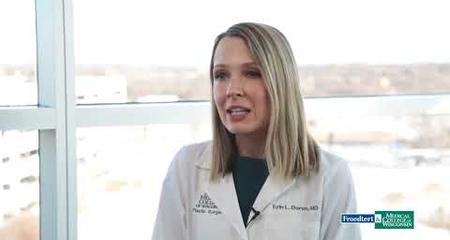 Some breast cancer patients develop lymphedema, a condition characterized by the swelling of the arm on the treatment side of the body. Breast cancer surgery often involves the removal of the lymph nodes of the armpit, and radiation therapy can damage the lymphatic capillaries. In some cases, the compromised lymphatic system is unable to drain lymphatic fluid adequately. Fluids then accumulate in the soft tissues of the arm, hand, breast or chest wall, causing swelling.
Some breast cancer patients develop lymphedema, a condition characterized by the swelling of the arm on the treatment side of the body. Breast cancer surgery often involves the removal of the lymph nodes of the armpit, and radiation therapy can damage the lymphatic capillaries. In some cases, the compromised lymphatic system is unable to drain lymphatic fluid adequately. Fluids then accumulate in the soft tissues of the arm, hand, breast or chest wall, causing swelling.
Symptoms of Lymphedema
Approximately one-third of women who have breast cancer surgery develop lymphedema. The early signs of lymphedema can be very subtle — a tight feeling of clothing, a ring or a watchband. Symptoms may include:
- Sense of heaviness in the limb or loss of motion
- Discomfort, ache, tingling/numbness or pain
- Swelling can affect the entire limb or just part of it.
- Limb temperature changes (warmer or cooler)
- Texture or color changes of the skin (whiter, redder, duller or shinier)
- Dry, scaly or cracked skin on your affected side
- Pitting of skin when pressed; marks left on the skin for more than five minutes after removing a bra, jewelry, clothing, etc.
- Inability to pick up a fold of skin on your affected side
- Fluid leaking through your skin
Lymphedema can limit your ability to perform physical activities, and self-consciousness can lead to social withdrawal.
Most breast cancer patients who experience lymphedema develop the condition within three years of their treatment. However, it can appear immediately after surgery or 20 years or more later.
Access to Specialized Lymphedema Care and Treatment
Patients in the Breast Cancer Program have access to specialized lymphedema care and treatment through our Department of Physical Medicine and Rehabilitation. The Cancer Rehabilitation Program is led by a board-certified physical medicine and rehabilitation physician who specializes in cancer rehabilitation. It also includes physical and occupational therapists with special training in lymphedema therapy. The team has extensive experience supporting breast cancer patients through every phase of lymphedema care.
Prevention
As part of the pre-surgery process, patients receive education on how to prevent lymphedema, including knowing the activities to avoid. Patients are also taught how to watch for the signs of early lymphedema. Early detection is important because subtle lymphedema is generally easier to treat.
Treatment
Lymphedema can be controlled through complete decongestive therapy (CDT), a comprehensive approach that includes several treatment elements. Specially trained physical or occupational therapists use gentle massage techniques to stimulate lymph flow and direct fluid toward healthy lymphatic outflow areas.
Compression bandages are used to decrease the flow of lymphatic fluid into the affected tissue and increase fluid re-absorption. CDT also includes special therapeutic exercises that help promote healthy lymphatic flow. Once swelling has been decreased as much as possible, the patient is fitted with a compression sleeve to help maintain swelling control.
Long-Term Control
Although lymphedema is not curable, most women can learn to manage its symptoms effectively and keep swelling down. Patients (and often family members) are taught how to bandage affected areas as needed. Once the initial stage of treatment is finished, patients continue to have regular follow-up visits with the rehabilitation physician. Patients also receive counseling on using diet, exercise and skin care to keep the condition under control.
Musculoskeletal Complications of Cancer Treatment
Some patients experience difficulty using the affected arm due to pain and decreased range of motion related to breast cancer surgery and radiation therapy. Care for patients who experience this complication is also provided by the cancer rehabilitation team led by a rehabilitation medicine physician. In addition to medication management, therapeutic injections (if needed), and physical and occupational therapy, patients may also participate in a general conditioning program in affiliation with Wisconsin Athletic Club.
Mammograms and the COVID-19 Vaccine – What You Should Know
Swelling of the lymph nodes is a known side effect of the COVID-19 vaccine as well as other vaccines. Although it is temporary and not harmful, these enlarged lymph nodes may be seen on your mammogram. Because swollen lymph nodes can indicate breast cancer, we may call you back for additional evaluation and possible follow-up imaging.
Virtual Visits Are Available
Safe and convenient virtual visits by video let you get the care you need via a mobile device, tablet or computer wherever you are. We’ll gather your medical records for you and get our experts’ input so we can offer treatment options without an in-person visit. To schedule a virtual visit, call 1-866-680-0505.
More to Explore





